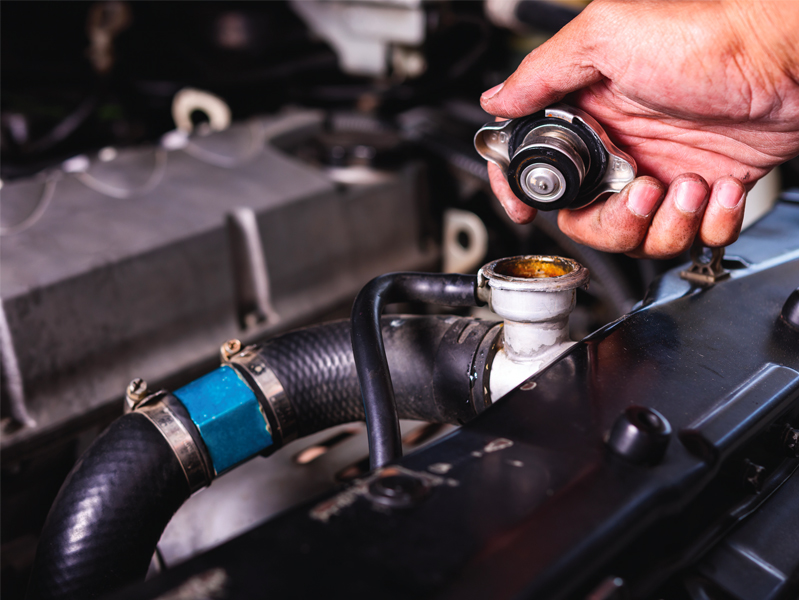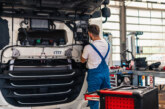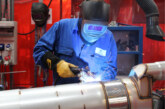
With the 2050 net zero deadline looming, the future of commercial vehicles in the UK is still unclear. The UK government is looking to new technology and materials to transform the sector. Tom Hyde, technical support manager for TotalEnergies UK, looks at developments in technology and materials.
Helping the UK meet its 2050 net zero deadline will be a significant priority for all sectors in the future, but especially for those working in transport. According to research released in 2022, HGVs accounted for 19% of road transport emissions in the UK, making reform to this sector a significant piece of the UK’s sustainability puzzle. The phased transition from fossil fuels for all vehicles, including HGVs, will require new infrastructure, a great deal of investment and the right political structure to make zero-emission transport ubiquitous.

Creating viable alternatives
Essentially, to meet climate requirements, the UK needs to provide readily available substitutes to traditional fuel sources. Renewable biomethane or hydrogen, for example, are practical alternatives, and there are projects ongoing to develop a hydrogen ‘ecosystem’ for transportation in Europe, such as TotalEnergies’ partnerships with Daimler Truck AG and Air Liquide. A significant benefit to these fuel sources is that vehicles operate and are refuelled in a similar way to the fossil fuel powered HGVs and vehicles – meaning minimal alterations to drivers’ schedules and working patterns.
The obstacle to overcome will be ensuring both supply chain resilience and affordability to encourage adoption. While the UK government has invested in several initiatives, the role of hydrogen itself on the path to net zero is still being debated. As ‘green’ hydrogen (produced using renewable energy) is not yet at the scale necessary for widespread use, so-called ‘blue’ hydrogen is seen by many as a stop gap solution, despite its fuel intensive production process.

Electric potential
The debate over electrification also charges on. In April this year, the Society of Motor Manufacturers and Traders urged UK ministers to devise a plan to assist the UK road haulage sector to decarbonise ahead of the phase-out of new diesel-engine vehicles in the coming decade. The trade body called on the government to publish a suitable strategy by early 2024, after finding that there is not a single dedicated electric charging or hydrogen refuelling site for HGVs on Britain’s major roads.
Charging infrastructure (or lack thereof, in this case) is often cited as an obstacle to electric truck adoption. It is worth noting that there have been significant developments in this sector, and trucks designed for base-to-base use are on the market. However, the weight and size of most heavy-duty batteries is another issue, as it could limit the number of goods that HGVs can carry.
The lack of viable infrastructure has also led to a lack of market confidence in electric HGVs. In fact, a recent GiPA survey found that only 3% of HGV operators would consider moving to electric when planning fleet renewal options.

A successful transition to electric will require a long-term plan to drive the rollout of a dedicated UK-wide HGV charging and fuelling network, combined with world-leading incentives to encourage uptake and attract model allocation. The sector may also need to think creatively in terms of infrastructure. For example, the Centre for Road Freight Sustainability has suggested that the best method for charging HGVs consistently would be an Electric Road System (ERS), which would charge HGVs via overhead cables, reducing both battery size and the scale of charging infrastructure required.
Self-driving vehicles?
Automation technology also has the capacity to be transformational to the haulage sector.
The UK government recently pledged £81 million in joint UK government and industry support for self-driving technology. One of the companies to benefit from this is hydrogen-powered commercial vehicle innovator, HVS, which was awarded £6.6m of this government funding to develop a zero-emission, autonomous HGV for the UK market. Whilst the company is still operating with prototypes now, the combining of hydrogen fuel cell technology with self-driving efficiency is a sign of the progress that could revolutionise the industry.
The idea could also help address the shortage of HGV drivers currently faced by the UK, while creating jobs in the manufacture and operation of these vehicles.
It is likely to be years until self-driving vehicles are integrated into everyday life due to the current lack of suitable infrastructure and legal and insurance frameworks to keep vehicles and people safe. However, in the interim, there is sure to be an increase in new autonomous and partially autonomous solutions.
What to do now?
With renewable-powered transport and electrification all on the horizon, ensuring best servicing practice and using the best products available, such as high-quality, fuel-efficient lubricants, is a step that HGV operators and fleet managers can take now to ensure they’re maximising both productivity and sustainability.
Major strides have been made over the past few years in terms of innovating engine oils and lubricants. The result is increased uptime and lower maintenance costs – particularly through products such TotalEnergies’ RUBIA TIR 9900 FE 5W-30 – as a result of reduced friction and viscosity of lubricants. These efficiency gains provide both emissions reductions and cost control benefits which equate to between 2% and 3% increases in fuel efficiency for commercial vehicles.

The future together
TotalEnergies believes our priority as a sector needs to be investing in new energy sources and technology for the long term, while ensuring vehicles are maintained and operated as sustainably as they can be right now. Achieving net zero emissions by 2050 will require collaboration between public and private sectors, and is something that government, industry, and regulators will have to work together to achieve.








